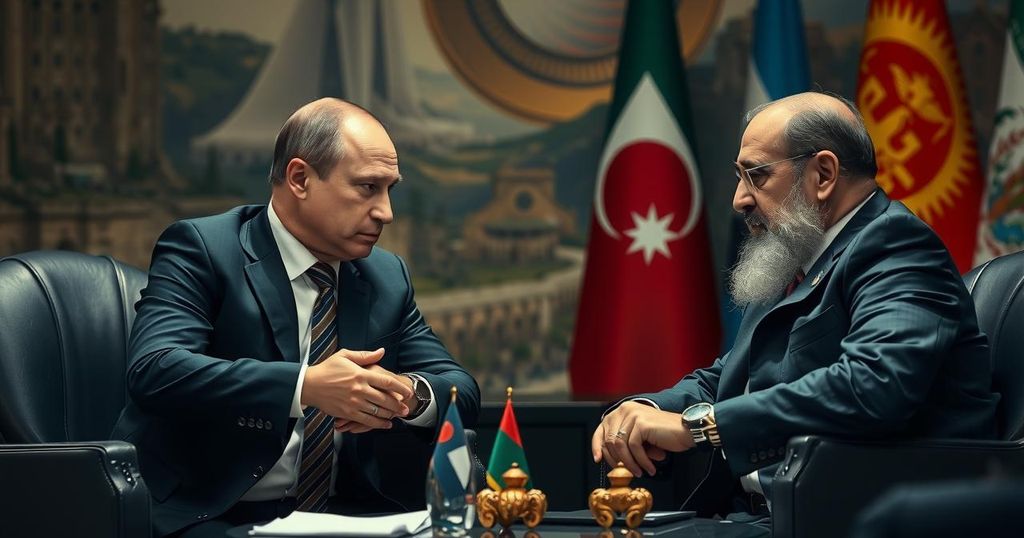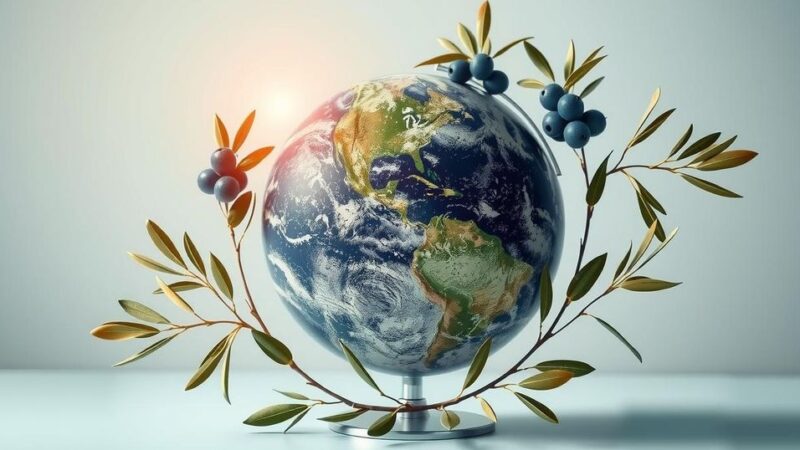Russian President Vladimir Putin met with Iran’s President Masoud Pezeshkian to discuss the escalating violence in the Middle East, particularly between Israel and Iran-linked groups. The meeting took place ahead of a strategic partnership agreement expected to be finalized at the upcoming BRICS summit. Both leaders expressed strong support for their nations’ bond and voiced criticism against Israel’s military actions in the region. The geopolitical relations between Russia and Iran have notably intensified since the conflict in Ukraine began, with both nations aiming to create a multipolar world order.
Russian President Vladimir Putin engaged in discussions with Iran’s newly elected President, Masoud Pezeshkian, amidst growing tensions in the Middle East characterized by increased hostilities between Israel and Iran, as well as its allied militant groups. This meeting took place on the sidelines of a regional conference in Turkmenistan and precedes the anticipated signing of a strategic partnership agreement between Russia and Iran. During their meeting, Presidents Putin and Pezeshkian deliberated on the escalating violence in the region. The Iranian leader expressed his aspirations to finalize the partnership agreement at the forthcoming BRICS summit, scheduled for October 22-24 in Russia. President Putin indicated that the positions held by both Moscow and Tehran on international matters often aligned closely, emphasizing the importance of their relations. He stated, “Relations with Iran are a priority for us. They are developing very successfully.” In concordance, President Pezeshkian remarked that the economic and cultural ties between their nations continue to strengthen significantly. Highlighting the current conflict, Pezeshkian condemned Israel’s military actions in Lebanon, calling them “savage attacks,” and urged for an end to the violence against innocent civilians, while accusing Western nations, including the United States and Europe, of complicity. This aligns with Russia’s previous denunciations of Israel’s tactics targeting civilians during its military engagements. The geopolitical dynamics between Russia and Iran have notably evolved since the onset of the Ukraine conflict in 2022, wherein the U.S. has alleged Iran’s provision of military supplies to Russia, a claim that Tehran has repudiated. President Putin has articulated intentions to reshape global alliances to counter Western influence, advocating for extensive international dialogue on a multipolar world, including engagement through various regional bodies such as BRICS, the Commonwealth of Independent States, and the Shanghai Cooperation Organisation. Other regional leaders participated in the conference, indicating a broader effort to address the intensifying geopolitical climate in the area.
The article addresses the critical diplomatic meeting between Russian President Vladimir Putin and Iranian President Masoud Pezeshkian set against a backdrop of escalating violence in the Middle East. The increasing hostilities between Israel and Iran highlight the fragile security situation in the region. Additionally, the strengthening ties between Russia and Iran are significant, particularly in light of the West’s response to both countries’ geopolitical maneuvers. The upcoming BRICS summit serves as a pivotal moment for these nations to solidify their strategic partnerships.
In conclusion, the meeting between Presidents Putin and Pezeshkian underscores the deepening diplomatic and strategic relationship between Russia and Iran amidst a backdrop of rising regional violence. This partnership is being formalized with a strategic agreement that seeks to strengthen economic and cultural ties, while also aligning their positions on global and regional issues. The implications of these discussions may influence the balance of power in the Middle East and reveal a concerted effort by both nations to navigate the complex geopolitical landscape against Western opposition.
Original Source: www.aljazeera.com






